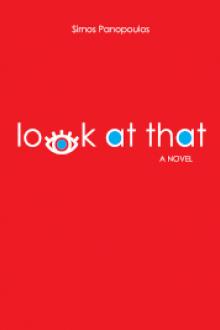Look at that - - (dar e dil novel online reading .txt) 📗

- Author: -
- Performer: -
Book online «Look at that - - (dar e dil novel online reading .txt) 📗». Author -
Prospective reader, rather.
Simos Panopoulos - Look at that
109
would allow him to rephrase his statements because they had supposedly been misinterpreted, or throw the blame on the publishing demon, the translator, and, if need be, blame the reader himself or herself. As for the choice of subject, and its approach as well, that of course would be exclusively up to his own discretion.
His goal for the time being? The same as that of a pole-vaulter who only cares if by chance he doesn’t make it over the bar, hence why he lowers it. Or, even more than the marathon runner who is disinterested in his personal record as long he makes it to the finish line, as the Jamaican bobsleigh24 crew in the Winter Olympics, who won’t even make it to that.
His wish? For the reader – whom he would certainly warn about the consequences if they happened not to – to read the book inside out, as well as each phrase individually. In fact, not just read it, but 1) thorough-ly examine it, 2) overcome their inherent tendency to utter “what’s this dude talking about?”, 3) explain it, having comprehended not only the phrase, but also the intention of its author behind it, 4) possibly con-clude whether he or she agrees or disagrees with it and, why not, 5) to indulge him/herself in a “Look at that!”. Was that so much to ask?
24 High-speed racing sport using sleds.
Yeah, all right. As if.
You’re expecting a bit much, don’t you think?
Simos Panopoulos - Look at that
110
His motto? Dum, not spiro, but scribo spero.
His style? Albeit still in the making, already a rebel, since it paid him no mind and had its own secret agen-da. But in any case, the very opposite of both socialist and capitalist realism.
His method? While, with most writers it loves to hide, his was an open book since he was circulating it stripped bare. Thus, any analysis of it is superfluous.
His topic? Human relations. Nothing more, nothing less. He would treat them like Marx did with com-modities.
His subject? Beyond even things unspoken, all things both unthinkable and unthought of.
Its manifesto? That fatally, like all manifestos, he would trample over it?
Every phrase an event, every paragraph a punch, ev-ery chapter a provocation, every book a scandal, but every word a tough guy.
Forever ostracised from his work: crimes committed against life, rape of any kind, any intercourse and not only those contrary to nature,





Comments (0)